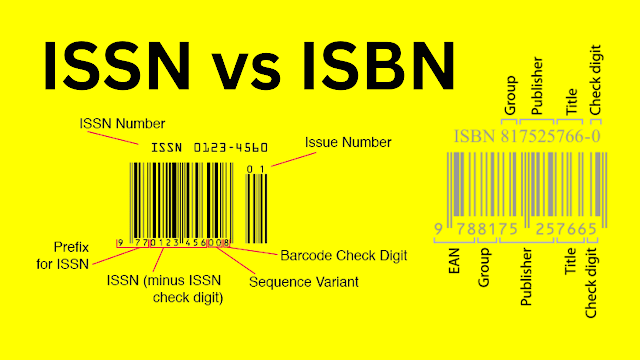ISSN vs ISBN: Understanding the Difference
 |
| ISSN vs ISBN |
Guys, there are tons of books and magazines out there in the world. But did you know there are special codes to identify them? Yes sir, and they are called ISSN and ISBN. Today we'll have an open chat about both, with a little fun mixed in too.
The ISSN
A. Meaning and Purpose
ISSN or International Standard Serial Number is a code that helps identify magazines, journals, newspapers, and other serial publications. It's a way to recognize them individually.
B. Making and Structure
An ISSN has two groups of 4 digits each, separated by a hyphen (1234-5678). The first group tells where the publication is from, and the second group is its unique ID.
C. Who Gets an ISSN?
Academic journals, trade magazines, newsletters, and newspapers - these all get ISSNs.
D. Why is it Important?
ISSN makes it easy to manage and find serial publications. Libraries use it to organize them, scholars cite it in their work, and it simplifies subscription processes for publishers and subscribers.
The ISBN
A. What is This Thing?
ISBN or International Standard Book Number is a numbering system that identifies books and other non-serial publications. It's a unique code assigned to each book.
B. How is it Made?
An ISBN has 13 digits, divided into parts - a language/country prefix, publisher identifier, title identifier, and a check digit for errors. The format uses hyphens or spaces (978-0-12-345678-9).
C. Who Gets ISBNs?
Books, e-books, audiobooks, software - all these things get ISBNs.
D. Why is it Important?
Without ISBNs, the book industry would struggle. This code enables identifying, ordering, inventory management and sales tracking for books. It's super helpful for book distribution and retail too.
Differences Between ISSN and ISBN
| Difference | ISSN | ISBN |
|---|---|---|
| Purpose | Identifies serial publications (e.g., journals, magazines, newspapers) | Identifies non-serial publications (e.g., books, e-books, audiobooks) |
| Composition | Two groups of four digits, separated by a hyphen (e.g., 1234-5678) | 13-digit number with specific format and check digit (e.g., 978-0-12-345678-9) |
| Assignment Criteria | Assigned to publications issued on a regular basis, intended to continue indefinitely | Assigned to individual, standalone publications |
| Managing Authority | ISSN International Centre and national ISSN agencies | International ISBN Agency and national ISBN agencies |
| Primary Application | Used in publishing and library industries for managing serial publications | Used in book publishing industry and bookstores for identifying and tracking individual titles |
| Validity | ISSN remains valid as long as the publication continues | ISBN changes with each new edition or format of a book |
| Structure | ISSN has a simpler structure with two groups of digits | ISBN has a more complex structure with specific segments for language/country, publisher, title, and check digit |
| Scope | ISSN covers a wide range of serial publications, including print and electronic | ISBN is primarily focused on books and related materials |
| Citation | ISSN is used for citing and referencing serial publications in academic works | ISBN is used for citing and referencing books and other non-serial publications |
| Acquisition | ISSN is typically assigned free of charge by national agencies | Obtaining an ISBN often involves a fee paid to the national ISBN agency |
Why Are Both Important
A. Easy Identification and Categorization
ISSN and ISBN are both unique identifiers, helping recognize and categorize resources in their respective domains.
B. Easier Information Access
These standard IDs aid in retrieving and accessing resources.
C. For Scholarly and Commercial Communication
In academics, ISSN is crucial for citation. In the book industry, ISBN is key for ordering, inventory, and sales.
How to Get an ISSN or ISBN?
A. Process and Requirements
Publishers or authors need to apply and meet the requirements.
B. Who Gives Authority?
ISSN comes from an international center, while ISBN has its own national agency.
C. Any Charges?
ISSN is mostly free, but there may be charges for ISBN depending on the country.
Such are the tales of these two IDs - one for serial publications, the other for individual books. In the publishing world, both are crucial for managing, identifying, and disseminating publications. These two vital codes enable knowledge preservation and seamless information exchange in publishing and dissemination.






